Digital AP Exams: More Difficult?
To accommodate for the pandemic, College Board has decided to offer digital versions of the Advanced Placement Exams this testing season. Kingsway’s AP Coordinators have decided to allow students to take the digital, at-home versions of qualified AP Exams. However, a question arises: Are digital AP Exams more difficult?
Background
Unlike the shortened digital exams of the 2020 testing season, this year’s digital exams will include multiple-choice as well as free-response questions, much like the normal paper exams. These digital tests can be taken on any computer, laptop, or Chromebook. Smartphones, tablets, and iPads are not allowed.
Almost all of the AP Exams will be administered virtually, with the exception of the World Language (Japanese, Chinese, Italian, Spanish, French, and German) and Music Theory Exams. Access to online translation tools and instruments prevents these tests from being held fairly. Students who are taking any of those exams will have to report to school to take the paper version.
Exams will be held during the weeks between May 18th and June 10th. See the schedule below.
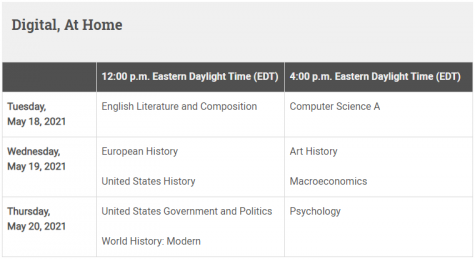
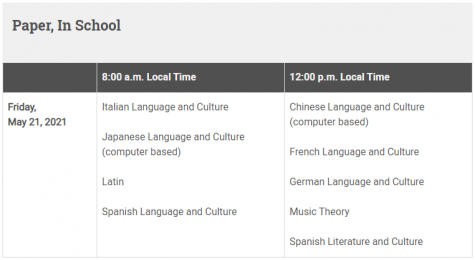
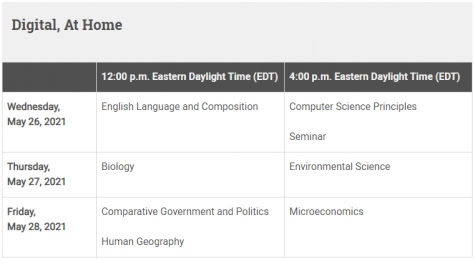
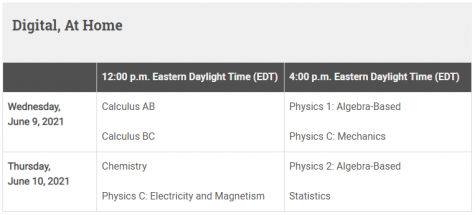
Exam Changes
While the digital AP Exams are meant to simulate their paper counterparts, there are key differences that may affect how difficult the tests are.
For all multiple-choice questions on the exams, students will NOT be allowed to move back and forth between questions. This means that as soon as you click the “Next Question” button, you will NEVER be able to go back to the question you were just working on. This also means that if you decide to skip a question, you will NOT be able to return and answer that question.
Aside from this, the number of questions and format of most exams have changed. Here are some of the main changes.
Math and Science Exams:
- No free-response questions that involve complex mathematical expressions or drawing figures or graphs will be asked.
- All equations must be typed. Handwritten equations cannot be uploaded. The Exam application will include common mathematical and scientific symbols in the answering area.
AP US History, World History, European History:
- All 3 Short Answer Questions (SAQs) MUST be answered. On the paper exam, only 2 of the 3 need to be answered.
- The Long Essay Question (LEQ) will be replaced with 2 mandatory SAQs for the digital exam only.
AP Chemistry:
- There will be a SECOND multiple-choice section of 40 questions in 60 minutes.
- There will be only 3 free-response questions to answer compared to the 7 questions on the paper exam.
AP Physics 1 and Physics 2:
- There will be a SECOND multiple-choice section of 25 questions in 45 minutes.
- There will be only 2 free-response questions to answer compared to the 5 questions on the paper exam.
AP Physics C: Mechanics and Physics C: Electricity and Magnetism:
- There will be a SECOND multiple-choice section of 35 questions in 45 minutes.
- There will NOT be any free-response questions.
AP Statistics:
- There will be a SECOND multiple-choice section of 11 questions in 25 minutes.
- There will be only 4 free-response questions to answer compared to the 6 questions on the paper exam.
To view the changes in more detail, click here.
So, will the exams be more difficult?
Whether or not the digital exams will be more difficult is dependent on the student.
For example, students that are better at multiple-choice questions will be thankful to have fewer free-response questions. Conversely, students who rely on the free-response sections to balance out their multiple-choice scores will view the exam as much more difficult.
Similarly, drawing graphs or solving equations on the Science and Math exams tend to be easier for most students compared to explaining nuanced concepts in multiple paragraphs on the digital exams.
However, for almost all students, the changes regarding the multiple-choice questions will definitely increase the difficulty of the exam. A common test-taking practice is to skip questions you are unsure of and come back to them at the end so you won’t waste time. However, with the new change, students will be forced to answer each question, meaning that if a student gets stuck on a question, they will be forced to waste time thinking of an answer or just give up and put a random answer. On top of that, students often use other questions to aid with determining an answer. Most times, other questions will provide key context or information that will often provide a hint to what the correct answer is. Now, answers are final as soon as students move on, meaning that if a student realizes that they put a wrong answer, they will not be able to fix their mistake.
There are many benefits and drawbacks to digital exams, depending on your perspective. In the end, however, College Board has promised that the digital and paper exams will be equal in the way they measure student success. Whether or not this is true will be determined after the AP Exams are held.
If you have any questions or concerns, leave a comment, reach out to your teachers/guidance counselor, review Kingsway’s brief, or visit the College Board’s website.
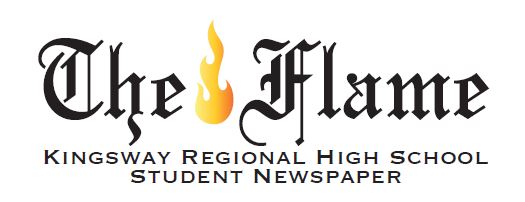

RNinan • Apr 8, 2021 at 9:04 AM
Tim, very informative article! This is very helpful for students who are not following college board website. The AP calendar is helpful not just for the students but also to the teachers. It will help teachers plan those weeks out early so students will not miss out on a lot of school work.